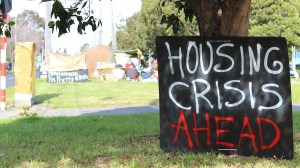
Is it the beginning of the end for rent bidding?
Fact-checked
Fact-checked
Checked for accuracy by our qualified fact-checkers and verifiers. Find out more about fact-checking at CHOICE

Need to know
- Rent bidding instigated by agents or landlords is illegal across Australia
- But tenants desperate for a home can and often do offer more than the advertised rent in hopes of being selected
- In Queensland, where the rental market is especially tough, rent bidding by prospective tenants may soon become a thing of the past
It’s a practice that works a lot like a bribe, and many feel they have no choice but to engage in it.
For people desperate to secure a property, it can also be a last resort.
Perhaps the most notorious form of rent bidding is when a rental agent or landlord lets prospective tenants know they should go higher than the advertised price if they really want the place.
Tenants end up offering more, without knowing if others have also offered more – or how much more
With demand high and supply critically low in recent years, many prospective renters have been willing to make side deals with the people who have the power to get them into a home.
Tenants end up offering more, without knowing if others have also offered more – or how much more
It was certainly happening in Sydney’s tough rental market before it became illegal for agents to instigate rent bidding in December 2022 and for landlords to do so in August 2023.
But it’s no secret that it continued to happen in Sydney after these reforms came into place. And you don’t have to be a cynic to assume it still goes on.
Nevertheless, rent bidding instigated by agents or landlords is now illegal everywhere in Australia.
Offering more without being asked
But there’s another, perhaps more insidious form of rent bidding that’s less visible than the standard kind.
It’s when the prospective tenant offers to pay more than the advertised price without being asked to.
This form of rent bidding has not been expressly outlawed in most jurisdictions across Australia, even though the economic discrimination is the same: those who can afford to pay more are more likely to find a place to live.

One mid-twenties couple we recently spoke to who were desperate to find a place in Sydney said they had offered between $25 and $75 more per week with every application.
“It’s just what we felt like we had to do,” Michael told us. “Every showing we went to was packed and we needed a place to live. I can’t know for sure if others also offered more, but I’m pretty sure they did. We both have good jobs, so it was probably that, plus the offer to pay more, that finally got us a place.”
Another renter who we’ll call Jack told us he offered to pay $30 more on a place advertised for $670 in the Beverley Hills suburb of Sydney in November 2022.
He did it because he was informed by his rental agent before the December 2022 ban took effect that a competing renter had offered $695.
“The desire to secure a tenancy was crucial given my circumstances of moving from Queensland to New South Wales,” Jack says.
I can’t know for sure if others also offered more, but I’m pretty sure they did
Sydney renter 'Michael'
He didn’t think it was fair for the agent to disclose bids from other people vying for the rental.
We heard from several other renters who offered more than the advertised rent, as well as renters who offered to pay several months’ rent up front.
Daniel told us he initially resisted offering more rent than was advertised but buckled after being rejected for several properties.
“After trying $10 more than the asking price and getting a little more interest but nothing final, I ramped up to also offering a large chunk of rent up front,” Daniel says.
“In the application for our current place, and other applications around the same time, I offered $10 over the asking pricing and roughly $2500 in advance rent. We were shortlisted for most of the properties we applied for when we offered that.”
Will Queensland stop all forms of bidding?
Rent bidding by renters certainly goes on, but lately there are signs that it may not go on forever.
In Queensland, where the shortage of rental properties has reached crisis proportions, the government recently announced a plan to prohibit agents or landlords from accepting offers to pay more than the advertised rent.
That would put an end to rent bidding in the state in any form – full stop.
There are some precedents. Tenancy law was updated in the Northern Territory in January this year, making it illegal for a landlord to accept more than the advertised rent unless unless additional services or benefits are offered.
The Queensland proposal has yet to become law, but Tenants Queensland SEO Penny Carr tells CHOICE that policymakers in the state have signalled rent bidding will come to an end with that one simple change.
“The agent won’t be able to accept a higher price than what has been advertised,” Carr says. “Nobody can offer more or ask for more.”

That’s important because, with tenants still allowed to offer more, the ban on rent bidding in Queensland and other states by agents and landlords may not have changed much.
“It’s hard to know if it made any difference,” Carr says. “There may have been agents who acted within the law, but there is definitely a lot of surreptitious encouragement to up-bid.”
Like Sydneysiders, some Queenslanders struggling to find a home will offer to pay several months up front, a practice that should also be prohibited if the proposed government reforms go through.
“It’s definitely my understanding that that would be outlawed as well, but we haven’t seen anything in writing yet,” Carr says.
It’s not a panacea because you will still have unaffordable rents being offered due to supply and demand, but it will even up the stakes a little
Tenants Queensland CEO Penny Carr
The reforms won’t put an end to the struggles renters face, but they should help.
“It’s not a panacea because you will still have unaffordable rents being offered due to supply and demand, but it will even up the stakes a little for people, particularly those on lower incomes,” Carr says.
Having the new regulations on the books should also make enforcement easier.
“I think having just a complete ban on rent bidding – it doesn’t matter who’s doing it, you can’t accept a bid above the advertised price – makes it a lot easier for regulators to gain compliance or for people to make complaints when there’s been no compliance.”
NSW should adopt the Queensland model
Tenants’ Union of NSW policy and advocacy manager Jemima Mowbray tells CHOICE that renter-initiated rent bidding in Sydney and other high-pressure markets is an unfortunate reality.
“Renters often find themselves in a very stressful situation, worried that if they don’t find a new home in time, they’ll have nowhere to go. They may feel like their only option is to make an offer above the advertised price. Some will do this knowing it will be a stretch on their budget, but they may feel they have no choice.”
In order to genuinely end rent bidding, landlords and their agents should not be allowed to accept offers of rent above what property is advertised for
Jemima Mowbray, Tenants' Union of NSW
On top of that, efforts by NSW Fair Trading to clamp down on illegal rent bidding have only gone so far, Mowbray says.
“Some agents continue to encourage applicants to offer higher rent if they’re keen to get an advantage over others when applying for a property.”
The solution is to adopt the proposed Queensland model, Mowbray says.
“In order to genuinely end rent bidding, landlords and their agents should not be allowed to accept offers of rent above what property is advertised for. Penalties should apply where they’re in breach of this.”
(Editor’s note: pseudonyms were used in this article.)
Related




